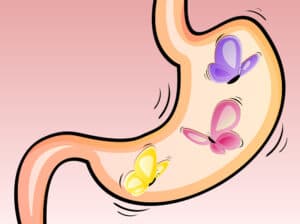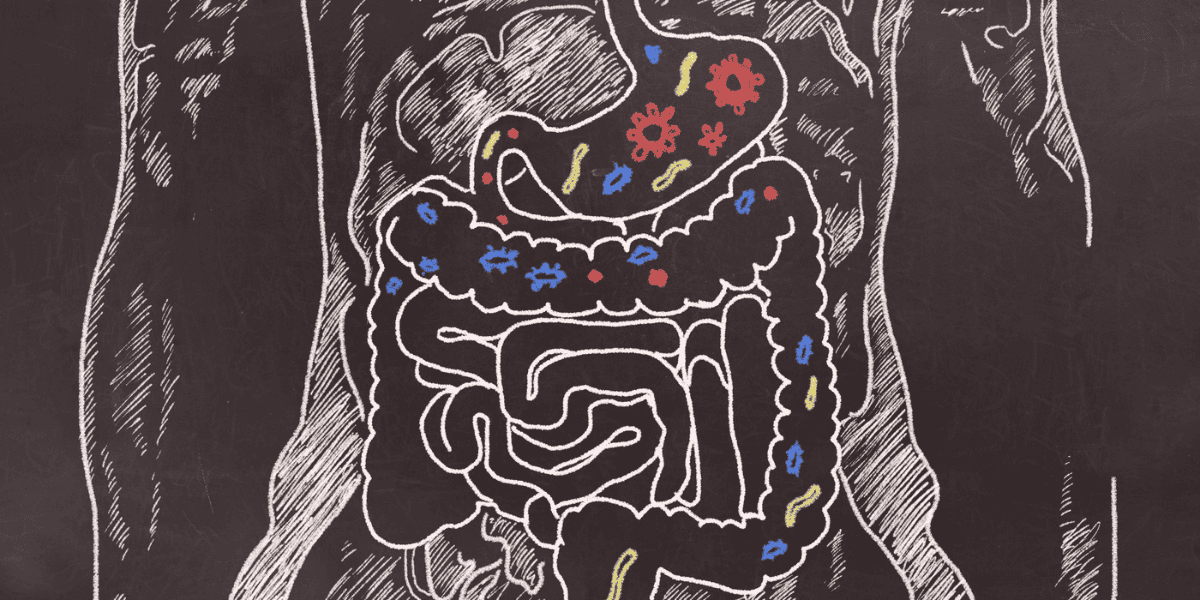SUMMARY: Understanding the connection between your gut health and your emotional state, not to mention your physical well-being, can impact your life greatly. We all want to feel “good”—energized, productive, and full of joy. Bloating and inflammation affect many people negatively—body AND mind. It may feel as though your belly is tugging on your brain, and can amount to a big, fat mental drain. Good news is there’s plenty of cutting edge research on what you can do to improve the health of your gut, and in turn, positively influence your mood and emotions.
By Carter Trent
The heart is often considered the seat of emotions, spawning phrases such as “from the heart” and “broken-hearted.” But recent scientific research reveals the gut holds an outsized impact on your mood and emotions, as well as overall wellness.
People typically limit the gut’s role to digestion, given it encompasses the gastrointestinal tract from the mouth, esophagus, stomach, small and large intestines, to the rectum. Understandably, it may feel like a stretch to consider your gut affecting your emotions.
Gut Alters Mood
Dr. Emeran A. Mayer, director of UCLA’s G. Oppenheimer Center for Neurobiology of Stress and Resilience, has spent decades studying the link between the gut and brain, and has a unique perspective on the issue: “The system is way too complicated to have evolved only to make sure things move out of your colon.” Dr. Mayer’s perspective is backed by scientific studies, and makes sense after understanding what enables the gut to influence your emotional health.
It starts with the fact that your body’s makeup includes single-celled organisms called microbiota. These microorganisms outnumber your cells by a factor of ten to one. The largest population of microbiota resides in the gut. This community of over a thousand different types of microorganisms, composed mostly of bacteria, is called the gut microbiome.
The gut microbiome plays a critical role in your health, helping to digest food, strengthening your immune system, and even managing obesity by regulating the body’s metabolism. Gut microbiota affect emotions by emitting neurotransmitters, used by your brain to regulate a vast array of human behavioral processes, from stress response to memory.
One of these neurotransmitters is serotonin, which alters mood. Normal serotonin levels in the body enable a calm, happier, and more focused attitude, which is why it’s called the body’s natural feel-good chemical. Gut microbiota produce over 90% of the body’s serotonin.
Butterflies Emerge
According to Dr. Mayer, “the gut converses with the brain like no other organ,” and as a result, “changes in your gut can affect your mental state.” The opposite is true as well. Dr. Mayer goes on to explain, “when you feel butterflies or a rumbling in your stomach when you’re nervous, or knots in your stomach when you’re angry, your mental state is affecting your gut.”
You know that feeling… the first time you have eye contact in-person with someone you really like, and you get those “swoon-like sensations in your stomach”—and then you try to figure out whether it’s “bliss,” or you’re walking down an abyss.

Your Second Brain
The microbiome’s connection to the brain happens through the enteric nervous system (ENS). Many people are familiar with the body’s central nervous system, but don’t realize their gut has its own nervous system, the ENS. It’s in constant contact with your brain, and has been referred to as the “second brain.”
The ENS is responsible for overseeing intestinal actions important to digestion, including motor functions, such as chewing, and blood flow to help with nutrient absorption. The gut’s microbiome participates in this process by helping to send and receive signals to and from the brain. This communication system is referred to as the microbiota-gut-brain axis.
The complex connection between the gut and brain is logical from an evolutionary perspective. The gut evolved to efficiently process food while guarding the body from harm, including pathogens and toxins introduced through food.
In addition, centuries before modern stressors, such as working a nine-to-five job or juggling a mortgage or rent payment, dominated our lives, humans had to be wary of life-threatening dangers, namely predators. As a result, when we feel stressed, our appetites diminish and our bodies are flooded with neurotransmitters, as part of our inherent fight-or-flight response to danger.
The idea that the gut plays a gigantic role in your health has been understood for millennia. Over 2,000 years ago, the Greek physician Hippocrates declared, “All disease begins in the gut.” Nineteenth-century doctors placed importance on the gut as a key factor in a person’s physical and emotional well-being.
Mind-Body Disconnection
At the same time, the likes of René Descartes argued for a separation of the mind and body. This argument finally won out in the twentieth century thanks to medical advancements, such as improvements in anesthesia, that enabled surgical solutions for gastrointestinal issues.
Simultaneously, Sigmund Freud’s psychoanalytic theory, used to treat psychiatric disorders, gained widespread adoption. This combined with the rise of pharmaceutical treatments, such as antidepressants in the 1950s, helped to cement the bifurcation of the gut and brain. Consequently, the medical community brushed aside ideas of the gut’s impact on our emotional states.
The Stress Connection
Moving into in the twenty-first century, thanks to improvements in DNA and RNA sequencing technologies, a flurry of scientific studies emerged showing a connection between our gut microbiome and emotions, such as stress.
An analysis of 59 scientific studies examining the connection between microbiota and mental health, published in 2021 by the American Medical Association, found that patients suffering from psychological disorders, such as depression and anxiety, consistently possessed a reduction in healthy gut bacteria.
One of the early studies showing this gut-brain connection, published in The Journal of Physiology in 2004, outlined how stress impacts gastrointestinal function, such as blood flow, and hurts the makeup of beneficial bacteria in the gut. This study also revealed that adverse changes in the gut microbiome are transmitted to the brain, bringing about effects such as nausea and abdominal pain, and illustrating the microbiota-gut-brain axis is a two-way street.
Gut Cognition
Moreover, the gut’s influence on your brain extends beyond your emotional state. A study of gut microbiota, published in The Journal of Physiology in 2016, revealed these microorganisms play a key role in brain development. Gut microbiota start to form at birth, with babies beginning with vastly different microbiomes depending on whether they are delivered vaginally or by Cesarean section.
Research published in the journal, Physiology & Behavior in 2015 identified a link between adverse changes in the gut’s microbiota and cognitive decline. Additional studies have shown that if the intricate ENS and microbiome system starts to break down, it leads to a slew of disastrous health consequences, including brain-related issues such as autism and Alzheimer’s disease.
One study, appearing in Oxford University’s International Journal of Neuropsychopharmacology in 2019, summarized the relationship between the gut and brain on our mental health in this way:
“Oftentimes, it is hard to differentiate where the causative elements lie: in the brain or in the gut… Therefore, it is not advisable to regard the two organs as separate systems but rather as a vastly more complex ecosystem of molecules, microbes, and neurons that should be approached with an interdisciplinary modus operandi.”
Your Gut Health: Diet Considerations
Fortunately, understanding the link between the brain and the gut provides a path to improving your physical and emotional health. The key is to maintain a robust gut microbiome, which means ensuring diverse microbiota reside in the gut.
Symptoms such as diarrhea, constipation, bloating, and nausea can indicate an imbalance in the gut microbiome. The same can be said for cognitive symptoms such as difficulty concentrating, memory issues, and headaches. These can be addressed by changes in diet, as well as exercise and getting enough sleep, which contribute to a healthy gut.
Research reveals people eating a Mediterranean diet rich in fiber and beneficial monounsaturated and polyunsaturated fats possess a healthier microbiome compared to those consuming a typical Western diet, which is high in sugar, refined carbohydrates, processed foods, and an excess of grains.
In fact, a study published by the Royal Society Open Science in 2020 revealed the Western diet impairs brain function, including learning and memory.
A note on fats…
When researching the Western, or Standard American Diet (SAD), you’ll see warnings about fat intake; particularly saturated fats. If you read it with blinders on, without digging deeper to make important distinctions, you’ll likely be misled by old faulty research that exacerbated carb-addiction, type 2 diabetes, and obesity. Fats are not the enemy; no one macronutrient (protein, fat, carbohydrate) is the enemy.
You can look to Dr. Chris Kresser, clinician and educator in functional medicine to expand your knowledge on the good, bad, and ugly on a variety of fats.
“Fats, in general, get a bad rap in our heart-healthy and fat-obsessed diet culture. For years, we’ve been trained to put foods containing fat (and fat itself) in the “avoid” category, even if the alternative is sugar laden and artificially flavored. (A homemade chocolate chip cookie will likely do less damage than its phony fat-free counterpart.) Yet the right fats are important for supporting immune function, insulating internal organs, regulating body temperature, maintaining healthy skin and hair, and aiding in the absorption of the fat-soluble vitamins (A, D, E, and K), among other crucial functions.”
Eat For Nutrition First
Consuming a wide variety of fruits and vegetables improves your gut’s microbiome. So does eating meat from “nose-to-tail,” as Dr. Paul Saladino, a leading authority on a meat-based diet, describes it. These foods benefit your gut by introducing new microbiota, and promoting the growth of helpful ones.
In particular, foods rich in probiotics and prebiotics provide nutrients to the gut’s microbiota. Probiotics are live microbes that support the body’s microbiome, and are found in foods prepared through fermentation, such as yogurt, kefir, and sauerkraut. Prebiotics are fiber and other nondigestible fare that also benefit the body’s microbiome, and are in foods such as garlic, asparagus, and Jerusalem artichokes.
Among prebiotics, studies show polyphenols increase beneficial bacteria in the gut. While red wine provides polyphenols, other sources include green tea, blueberries, and dark chocolate.
Modern research has shown a more holistic approach to well-being, one that recognizes the interdependence of body systems, even those as seemingly diverse as the gut and the brain, can lead to better health outcomes, both physically and emotionally. Our renewed understanding of the gut’s connection to mood and emotions gives new meaning to author Richard Ford’s 1845 assessment, “The way to many an honest heart lies through the belly.”
~
Published on October 20, 2022.
To contact A Voice For Choice Advocacy, please email media@avoiceforchoice.org.
If you would like to support the research and health education of AVFC editorial, consider making a donation today.

